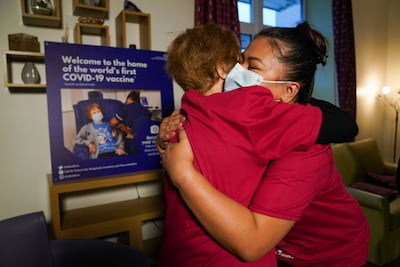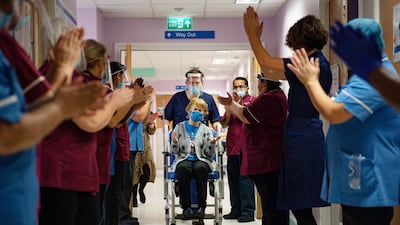Tens of thousands of volunteers and medical staff are being recruited to help the UK’s coronavirus vaccination campaign reach people who are unvaccinated.
On the first anniversary of the first UK Covid vaccine jab, royalty, celebrities and medics are all joining drives to persuade vaccine holdouts that the time has come.
One such person, Toyin Oladotun, said she overcame her worries about the vaccine months after Margaret Keenan, 91, was given the first Pfizer vaccine in Coventry, central England.
Across Britain, there is about 6.4 million people unvaccinated, or about 10 per cent of the eligible population.
Prince Charles and Camilla, Duchess of Cornwall, spoke of the dangers of being unvaccinated.
“To all those who have not yet had the vaccine or are hesitating before getting a booster, we can only urge you to look at the evidence in our intensive care wards and listen to those who work there,” they said.
"People who are unvaccinated are at least 10 times more likely to be hospitalised or die than those who have had two vaccine doses.”

On Tuesday, the National Health Service (NHS) began a hunt for volunteers and staff to join the vaccination campaign.
Amanda Pritchard, chief executive of the NHS in England, said: "One year ago today, the NHS made history when Maggie Keenan was the first person to receive a Pfizer vaccination outside a clinical trial.
"Maggie's jab marked the launch of the world's first national vaccination programme – watched around the globe it was a moment of hope after months of fear.
"Since that point, the NHS vaccination programme, the biggest and fastest in our history, has delivered almost 100 million jabs, protecting tens of millions of us against the virus.
"The roll-out would not have been as successful as it has been without the help of thousands of volunteers who have given over one million hours to deliver vaccines and help us save thousands of lives," Ms Pritchard said.
"Now the NHS is ramping up its vaccine drive once again as millions more become eligible for their booster, sooner, following updated guidance, and so we are now recruiting 10,000 more staff to help us in our national mission.”
Mrs Keenan urged people to get a vaccination.
The 91-year-old said: “The best Christmas present I could have is being in good health and having had the jab and feeling free from this horrible virus.”
The grandmother, who has also had her booster and flu jabs, described being a global name as “wonderful”.
The jobs include vaccinators, administration staff and healthcare support workers. The NHS is also working with the Royal Voluntary Service and St John, to drum up the support of more than 42,000 volunteers.

In the last 12 months, more than 51 million first vaccine doses of have been given in the UK, along with more than 46 million second doses and 20 million extra doses.
Almost 3,000 vaccine sites have been established across the country, staffed by more than 92,000 NHS staff and 118,000 volunteers.
Last week, Prime Minister Boris Johnson said the health service would offer booster shots to adults in England before the end of January in response to the new threat from the Omicron variant.
One of the UK’s most senior doctors said there had been a "fairly constant" stream of about 6,000 patients in hospitals across England since the summer.
If more people had vaccinations that figure would fall and free up time for the NHS to make inroads into the backlog of care, according to Professor Stephen Powis, the NHS national medical director for England.
"There's no doubt that the NHS is under intense pressure – those are 6,000 patients that we wouldn't normally have at this time of year,” Prof Powis said.
"And, of course, we have additional beds closed because of the strict infection control measures that we quite rightly have to put in place in our hospitals.
"So it feels very busy. And it's very busy in the NHS. And there's a possibility that other infections such as flu might start to circulate more," he said.
"So what's really important is that you get that jab because the way the public can help us to reduce those numbers in hospital is to make sure that you have your first or second dose and, of course, that all-important booster, which recent data has shown is highly effective against preventing severe disease."


